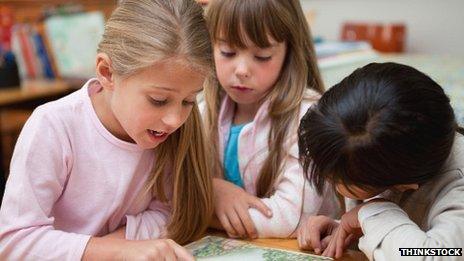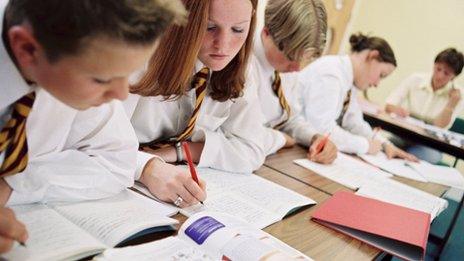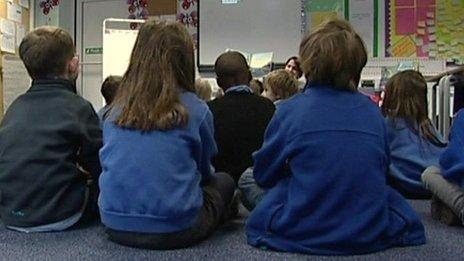Primary school places revealed as squeeze continues
- Published
- comments

Families are discovering which school their children will attend
England is facing a "growing crisis" over primary school places, a teachers' leader has said, as parents find out where their children will attend.
Dr Mary Bousted, of the Association of Teachers and Lecturers, accused Education Secretary Michael Gove of failing to ensure places are available.
Early figures suggest tens of thousands of pupils will not get their first choices.
The government said it had doubled funding for new school places to £5bn.
It highlighted how it had allowed good schools to expand and said most families were getting their first choice of school.
'Not enough money'
But early figures indicate that a child's chances of achieving a first choice depends heavily on where they live, with almost all getting their top preference in some areas, and more than a third missing out in others.
Dr Bousted told the Association of Teachers and Lecturers (ATL) annual conference in Manchester: "We know that there is a growing crisis in primary school places and we know that the government, for all the money they say they are throwing at the problem, they simply haven't got the mechanism, they haven't got the ability, to plan school provision where it's needed.
"They have divested themselves of the levers to manage this situation.
"As soon as they prevented local authorities from building primary schools and they left it to the market, to free school providers and academy sponsors, they've come across two main problems."
She added: "Local authorities say that despite the extra money, there isn't enough money, and because of the land prices, it's very difficult for free schools to get established.
"It's no surprise that there's a crisis in primary school places, because the secretary of state, Michael Gove, has divested himself of his first key responsibility, which is to provide school places for children."
This year sees the first co-ordinated allocation of primary school places across England, with emails and letters about places being sent out on the same day. But data on the national picture will not be available for several weeks.
Fast-rising birthrate
However, early statistics show that in some London boroughs as few as six out of 10 children got their first choice. In Kensington & Chelsea just 61.6% (595) got their top preference, down from 65% (623) last year.
In neighbouring Hammersmith & Fulham, one in four (24.8%) children missed out on their first choice.
Across London as a whole 81% of children received their first choice, despite a 3% rise in pupil numbers.
In Bristol, 94% of children have been allocated one of their three preferences - with 82% getting their first choice.
And in Manchester, where there has been population growth, 87.5% were offered their first preference school. A total of 4.5% - 303 children - were offered places at schools that they had not chosen.
In Kent and in Medway, where more children applied this year, around 85% have got their first choice.
Primary places have been under increasing pressure, with many schools adding extra classes to keep pace with a fast-rising birthrate.
Between 2012 and last year, primary pupil numbers grew by almost 100,000 and councils say funding has failed to keep up.
Councils are calling for more powers over the opening of new schools as the pressures are set to grow in coming years.
The Department for Education published information showing how councils had "firm plans" for an extra 300,000 places - with a further 57,000 needed to meet the expected demand in the autumn of next year.
It also said that the numbers in primary school rose from 3.9 million in 2012 to more than 4.01 million in 2013.
And it revealed huge increases in some areas, such as Croydon, south London, where pupil numbers are expected to rise 44% between the summer of 2010 and autumn next year. In Barking & Dagenham there is an increase of 43%.
But the figures also show how this population surge is not reflected across the whole country, with more than 430,000 vacant places last year.
'Tackling underperformance'
Shadow education secretary Tristram Hunt said this month that the government was failing to create school places where they were most needed.
Mr Hunt said the government had created a "crisis in school places" with more children in "temporary and unsuitable classrooms and children forced to travel further and further to get to school".
But the Department for Education said: "We are increasing the number of good school places by tackling underperformance and opening new free schools and academies. We have also more than doubled to £5bn the funding available to councils to create new school places, and are allowing good schools to expand without the restrictions and bureaucracy they faced in the past."
The Local Government Association wants councils to have power over building new schools to meet local demand, and it says that a survey shows such a change would have widespread public support.
Natalie Evans, director of New Schools Network - which supports the opening of free schools - said they were playing a vital role in helping address both quality and quantity in primary places.
- Published14 March 2014

- Published13 December 2013
